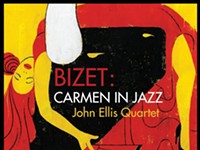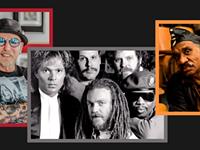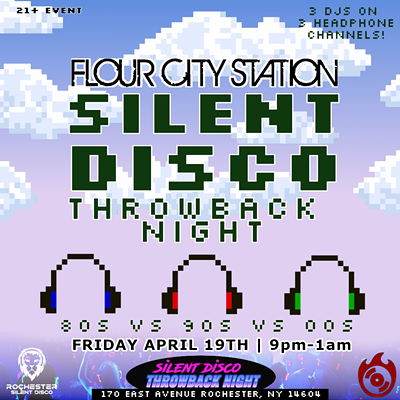[
{
"name": "500x250 Ad",
"insertPoint": "5",
"component": "15667920",
"parentWrapperClass": "",
"requiredCountToDisplay": "1"
}
]
Over his six-decade career, bassist Ron Carter has been part of some of the greatest bands in jazz history. He's played with Miles Davis, Stan Getz, Eric Dolphy, Coleman Hawkins, Sonny Rollins, Wayne Shorter, Bill Evans, and many more.
He has received just about every honor awarded in his field. But when he is inducted into the Rochester Music Hall of Fame Sunday, it will be a special occasion.
"This is where I began my musical education," Carter says. "This is where I learned the rules of the game. I learned how to practice, I learned how to be a teacher, I learned what friendship is, and I learned how to avoid certain situations I never experienced before. It was an important time in my life. I met my wife up there."
Carter came to Rochester from Ferndale, Michigan, to attend the Eastman School of Music in the mid 1950's.
"I went away to school and I missed my family terribly," Carter says. "I was basically on my own. When I arrived I started to look for a part-time job because the scholarship didn't cover all the bills."
It didn't take long to find gigs. Carter joined the house band at the Ridgecrest Inn, a club that was on the itinerary of jazz bands doing east coast tours. There he met Sonny Stitt, the Horace Silver group with Art Farmer and Clifford Jordan, Dizzy Gillespie's band with Sam Jones, and Carmen McRae's band with Ike Isaacs.
"I got a chance to meet and hear a lot of people play the music so it was quite a free education for me," Carter says.
On the local scene, Carter became friends with two other future hall-of-famers, Chuck and Gap Mangione.
"Chuck's parents were instrumental in a lot of musicians eating in Rochester," Carter says. "They had a grocery store and they were free and liberal and available and loving and they made sure that they adopted all these guys who were going to school and were playing jazz and hadn't had a meal in over 20 minutes.
"We were fed well and their home was open to us with all the love that parents have for their kids. They were great friends with Dizzy Gillespie. That's how I met Dizzy on a personal level because he was over there eating dinner all the time."
Gap Mangione (another one of the 2015 inductees) was active in the Syracuse Jazz Society when he attended Syracuse University in the late 1950's. "I went to play concert with him in Syracuse and that's where I met my soon-to-be wife," Carter says.
Like a lot of cities in the late 1950's, Rochester had its share of racial problems. Carter was no stranger to prejudice.
"I was 18 or 19 and came from Detroit where the lines were pretty blatantly drawn," Carter says. "They were also drawn in Rochester but not with such heavy ink. And spending so much time with the Mangiones, who didn't understand what the line was all about — I was one of their kids — I didn't have those kinds of immediate confrontational attitudes toward me. But it was clear even as a 19 year old, when you see the lines drawn, you're pretty aware of them."
One time, driving back to Rochester from New York City with "Pee Wee" Ellis, Carter was pulled over on the Thruway by a trooper who thought they were hauling drugs.
"They took off the hubcaps and emptied out the trunk of my 1950 Ford. I was late for my rehearsal with the philharmonic orchestra at school." He had to hire a lawyer to get the charges dropped.
After graduating in 1959 Carter moved to New York City. One week later he left for a six-month tour with Chico Hamilton and he's hardly slowed down since. The Hamilton gig was followed by stints with Bobby Timmons, Herbie Mann, Betty Carter, Kenny Burrell, Art Farmer, and Jim Hall. Then he joined one of the greatest groups in jazz history, the Miles Davis Quintet (from 1963 to1968).
In fact, he's played with just about every significant jazz great that he's wanted to, except one: pianist Ahmad Jamal.
"He's still on my list, man," says Carter. "I keep telling him, 'I'm going to make a call one day and tell your bass player to go watch CNN.'"
If they record together, that would add another album to one of the most astonishing oeuvres in music history. It's estimated that Carter has appeared on well over 2,000 albums, among them some of the greatest ever recorded, including "Seven Steps to Heaven," Miles Davis; "Red Clay," Freddie Hubbard; "Maiden Voyage," Herbie Hancock; "Speak No Evil," Wayne Shorter; and "Killing Me Softly," Roberta Flack. Could he tell he was working on classics at the time?
"You can remember a shooting star but you can't remember when it took place," Carter says. "All you remember is there was an event you were part of. You don't know when the record is going to be released, if it's released at all. You don't know how they'll treat it.
"You kind of have a sense of an occasional shooting star on these record dates. Do I remember all of them as very special, earth-shaking and historical? I never had time to think about that because I was busy trying to do my job, which was to make this band feel like I belonged there, and that my contributions were what they would expect of me."
The calls keep coming, now from a new generation of musicians.
"I treat these newer recording sessions as a chance to see if I've learned anything over these past 50 years that I couldn't have added 50 years ago because I didn't know it."
Speaking of...
Latest in Music Features
More by Ron Netsky
-

Album Review | 'Bizet: Carmen in Jazz'
Mar 26, 2024 -
'To Swing Is the Thing" by Mike Melito
Aug 10, 2023 - More »








